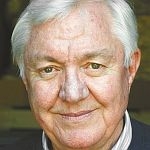 (Host)
(Host)
Ever since his death in 2004 there have been rumors that Palestinian
leader Yasser Arafat did not die of natural causes. As commentator and
veteran ABC News foreign correspondent Barrie Dunsmore tells us today,
new information has come to light that suggests Arafat might have been
poisoned.
(Dunsmore) The latest speculation about possible foul
play in Yasser Arafat’s death, was set off by an investigation by Al
Jazeera, the Gulf Arab television network. According to its report, the
Swiss Radiophysics Institute found "surprisingly" high levels of
polonium-210 on Arafat’s clothing. This is the substance used a few
years ago to kill a former Russian spy who had defected to the West.
However the Swiss also said the symptoms described in Arafat’s medical
records were not consistent with radioactive poisoning.
Still
this was enough to have Arafat’s widow Suha ask that her husband’s body
be exhumed to have his remains tested. And earlier this week,
Palestinian President Mahmoud Abbas gave his final approval to have the
body removed from its mausoleum in the West Bank city of Ramallah. In
addition to a new post mortem, Abbas has also called for an
international investigation into what and who may have killed Arafat.
The
mystery surrounding Arafat’s death, has led to many conspiracy theories
– the principal one being that the Chairman of the Palestine Liberation
Organization had finally been done in by his arch enemies – the
Israelis. This is certainly plausible. But I have my doubts.
Throughout
his life, Arafat had many enemies – and they were by no means all
Israelis. At various times, the Jordanians, the Syrians and various
Lebanese factions – not to mention his political opponents among
Palestinians – would have been happy to see him removed.
Arafat
was acutely paranoid. Legend once had it that he never slept in the same
place two nights in a row. When I was working in the Middle East in the
1970s and 80s, I interviewed him a few times. On those occasions we
would go to a designated place – always in the middle of the night. Then
we would be taken somewhere else in a darkened vehicle – and sometimes
to still another place. Even then, after waiting for hours, there might
be no meeting at all.
Yet in spite of all this cloak and dagger
stuff, some of my journalistic colleagues and I believed at the time,
that if the Israelis really wanted to get rid of Arafat, they were smart
enough to figure out how to do so.
The fact that they didn’t
led of us to conclude that the Israelis were quite happy to have Arafat
be the poster boy for Palestinians terrorism. This was no glamorous
revolutionary the likes of Che Guevara. This was a rumpled, somewhat
over-weight, middle-aged man who couldn’t grow much of a beard and most
of the time simply looked like he needed a shave. Nor was he
intellectually suited to be like Gandhi and use non-violent tactics
instead of terrorism to achieve Palestinian statehood.
By the
end of his life, Arafat had failed because he was basically afraid to
make peace with Israel. And then, as now, I expect that was fine with
the Israeli government.